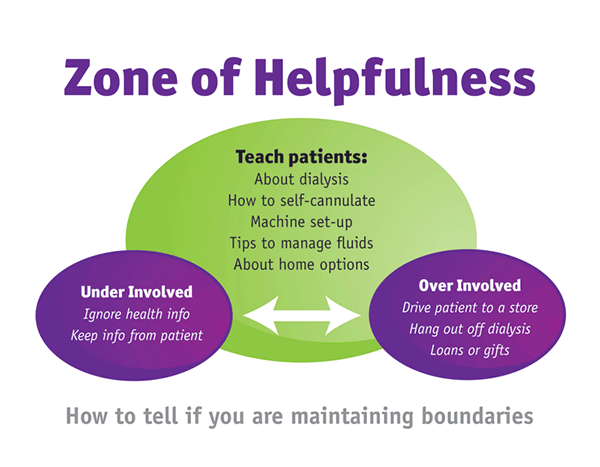Understanding Boundaries
A boundary is like the fence between your house and your neighbor’s house. It helps each of you to see where the property line is (the boundary). If you cross the fence and try to change your neighbor’s yard without permission, you are going to have problems. In healthcare, there are many types of patient/provider relationships and boundaries. When we inappropriately cross these boundaries into areas of a patient’s life that are not related to dialysis care, we can run into problems. To make sure you are maintaining proper boundaries with your patients, you need to learn about your roles and responsibilities on your side of the fence, and your patients’ roles and responsibilities on their side of the fence.

Take a look at this diagram as you think about boundaries. The green area in the middle—the “Zone of Helpfulness”—is where you provide good care to your patients and also do a good job of keeping proper boundaries. Behaviors you would find in the “Zone of Helpfulness” include things like:
- Teaching your patients about dialysis
- Showing a patient how to self-cannulate or set up the machine
- Talking with a patient about tips for managing fluids
On the right side of this diagram you see the box titled “Over Involved”. This is where most boundary violations occur. When you move into the over-involved area, you have over-stepped your role as a professional. You may be doing things for a patient that would be better done by the patient, a family member, or a patient’s friend. This might include doing special favors for patients like:
- Using your own car to take a patient to the store
- Spending time with a patient outside of the dialysis center
- Making a loan to a patient or giving him or her a gift
Boundary violations can also occur when you are “Under Involved” in your patient’s care; for example, if you purposely keep important information from a patient or if you ignore a patient who tells you that she has been having back pain or some other health issue that you might think is not related to dialysis. These are clear instances of being under-involved in a patient’s care.